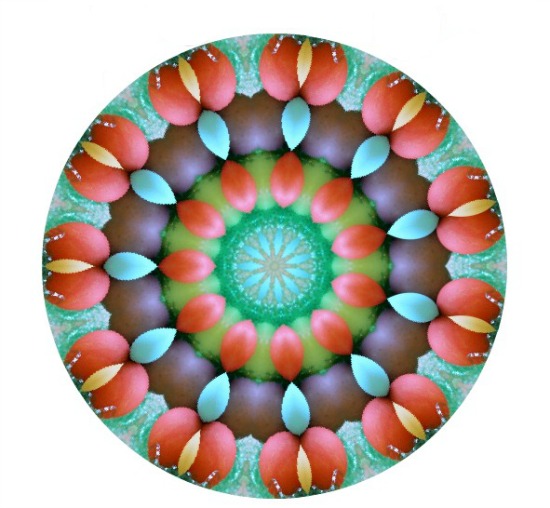


- #Create your own kaleidoscope image how to#
- #Create your own kaleidoscope image series#
- #Create your own kaleidoscope image free#
In graphic design, I think that it is important to use the assets that you have in creative ways. So if you don't like the way it looks, you can easily change it. Your adjustments can now be used as a Smart Filter. Now select the Kaleidoscope layer and go to Filter > Camera Raw Filter. This will allow us to use the Camera Raw Filter non-destructively. Right click on the Kaleidoscope layer and select Convert to Smart Object.
#Create your own kaleidoscope image free#
Feel free to use an adjustment layer if that is what you prefer. While there are a ton of ways to add color adjustments to images in Photoshop, in this tutorial, I am going to use the new Camera Raw Filter to adjust the Temperature, since the Camera Raw Filter is where we started. Select all your layers and merge them by right-clicking on them in the Layers Palette. This since photo was taken during the winter, I think we need to cool it down a bit. The light from the original photo is giving some areas a yellow glow. The kaleidoscope effect is now done but I think that this image is a bit warm. Your image should now look similar to this.Īt this point you could consider this tutorial complete. Tip: If you see any transparent pixels at the bottom or right side of your canvas. Now move the Top Right layer into position, as shown. Now go to Edit > Transform > Flip Horizontal. Select the Top Left layer and press Command/Ctrl-J on your keyboard. Now we will need to duplicate and flip our Top Left layer to cover the empty parts of the canvas. Your canvas should look very similar to this. Setting the Width and Height to 200% will double the size of your canvas. Make sure to set the Anchor to Top Left and change the units to Percent. Now we need to expand the canvas a bit to create the kaleidoscope effect. Step 4īefore we proceed to the next section, double-click on the locked background layer and name it Top Left to unlock it. This is what your image should look like after you have cropped out the parts we do not need. Also, make sure to select the Delete Cropped Pixels option. Your crop doesn't have to be perfect, just make sure to crop out the stairs and the light. Select the Crop Tool and crop your image as shown below. Now that we have our adjustments applied, and the image opened in Photoshop, it is now time to crop.

Your photo should now look similar to this image. Play around with the ACR settings and see what type of effects you can achieve on your own. Don't feel obligated to copy the settings that I used. Tip: In this step, I encourage you to have fun and be creative. Shooting your photos in raw format will give you the most flexibility when applying adjustments to your photos. Your first step should be to open up the DNG file that I supplied you with. You will need the following assets to complete this tutorial. The result will be a really cool-looking kaleidoscope effect that can be used in a variety of graphic design projects, and on just about and photo.

#Create your own kaleidoscope image how to#
In this tutorial, I would like to show you how to take one of the lesser quality photos in your collection and quickly turn it in to something that you can use for a project. Some of the photos that I took turned out great, others, not so much.
#Create your own kaleidoscope image series#
On New Year's Eve, I took a series of photos in Central Park for the fireworks. Personally, I love to shoot photos, and it is nice to have a good catalog of photos in my arsenal, just in case. You never know when you might need to run out and shoot a photo of your own for a project. Photography is a skill that I believe most designers should have at least a fundamental understanding of.


 0 kommentar(er)
0 kommentar(er)
